Owning a home is more than paying off a mortgage. It includes home safety inspections and care to keep it valuable and safe. It’s recommended to save one to three percent of your home’s purchase price every year for maintenance. For a $100,000 house, this would be around $3,000 yearly. Maintenance should be regular, like monthly, seasonal, and yearly tasks.
Taking a proactive monthly maintenance approach can cut down on big repair costs later. It includes checking HVAC filters, looking for leaks, keeping caulk fresh, and testing smoke and carbon monoxide detectors.
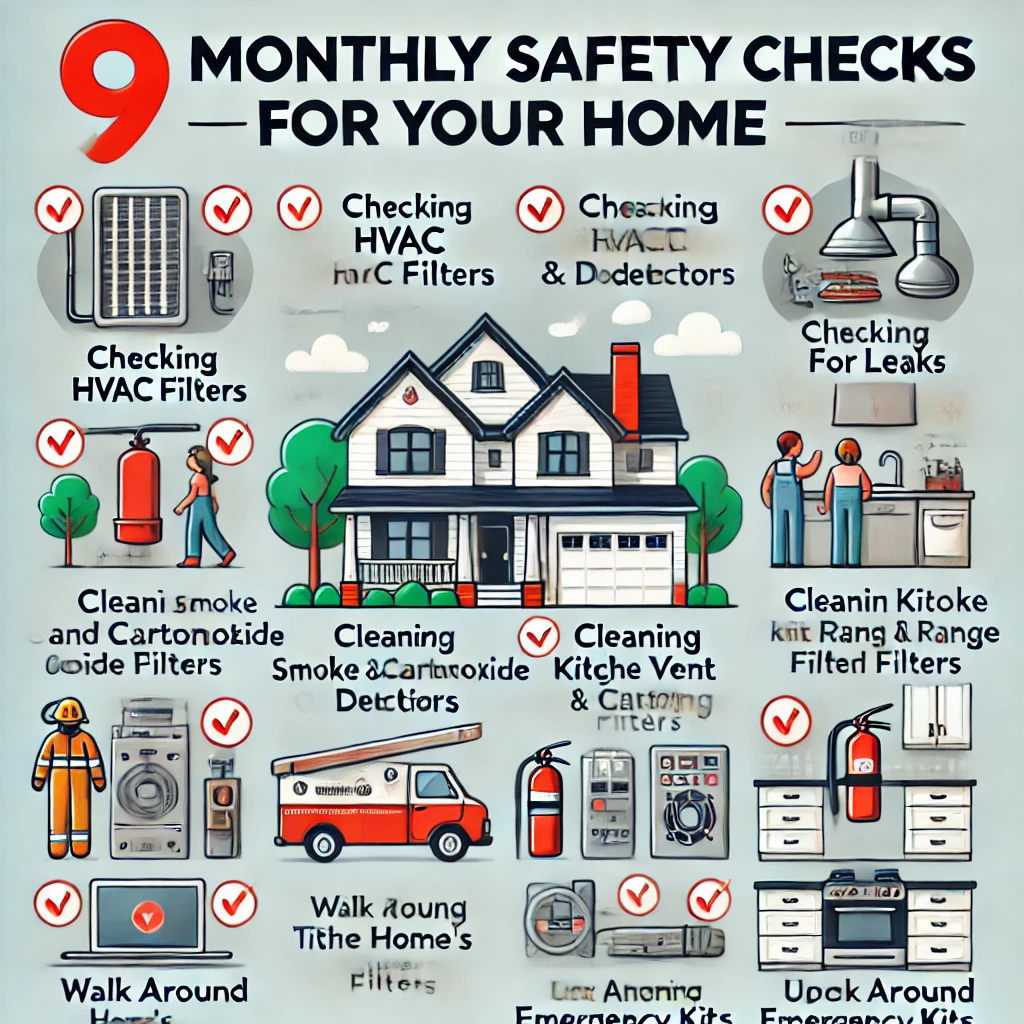
Introduction to Home Maintenance
Home maintenance is one of the most important responsibilities of owning a home. By following a home maintenance checklist, you can prevent costly repairs, maintain your property’s value, and keep your living space safe and energy efficient. Regular maintenance—whether it’s monthly, seasonal, or annual tasks—helps you spot small issues before they turn into expensive problems. Staying proactive with your maintenance checklist not only saves money but also ensures your home remains comfortable and in top condition year-round. Prioritizing these tasks is the best way to protect your investment and enjoy peace of mind.
Creating a Home Maintenance Routine
Establishing a home maintenance routine is the key to keeping your property in great shape. Using a monthly home maintenance checklist helps you stay organized and ensures you don’t overlook important tasks like replacing HVAC filters, testing smoke and carbon monoxide detectors, and checking for leaks. By breaking down your maintenance checklist into smaller, manageable steps, you can tackle each task without feeling overwhelmed. Don’t forget to schedule professional servicing for your major home systems, such as the HVAC system and heating system, to keep everything running smoothly and prevent costly repairs. Regular attention to these maintenance tasks will help maintain energy efficiency and keep your home safe for everyone.
Inspect and Test Smoke and Carbon Monoxide Detectors
Smoke and carbon monoxide detectors are key for our safety at home. Homes without working smoke alarms see 3 out of 5 fire deaths. Testing smoke detectors should be a crucial part of your monthly home systems check up to ensure fire safety. Testing them once a month helps keep us safe. To ensure detectors function properly, remember to replace batteries regularly as part of your routine maintenance. It means if your alarm works, the risk of dying in a fire is cut in half.
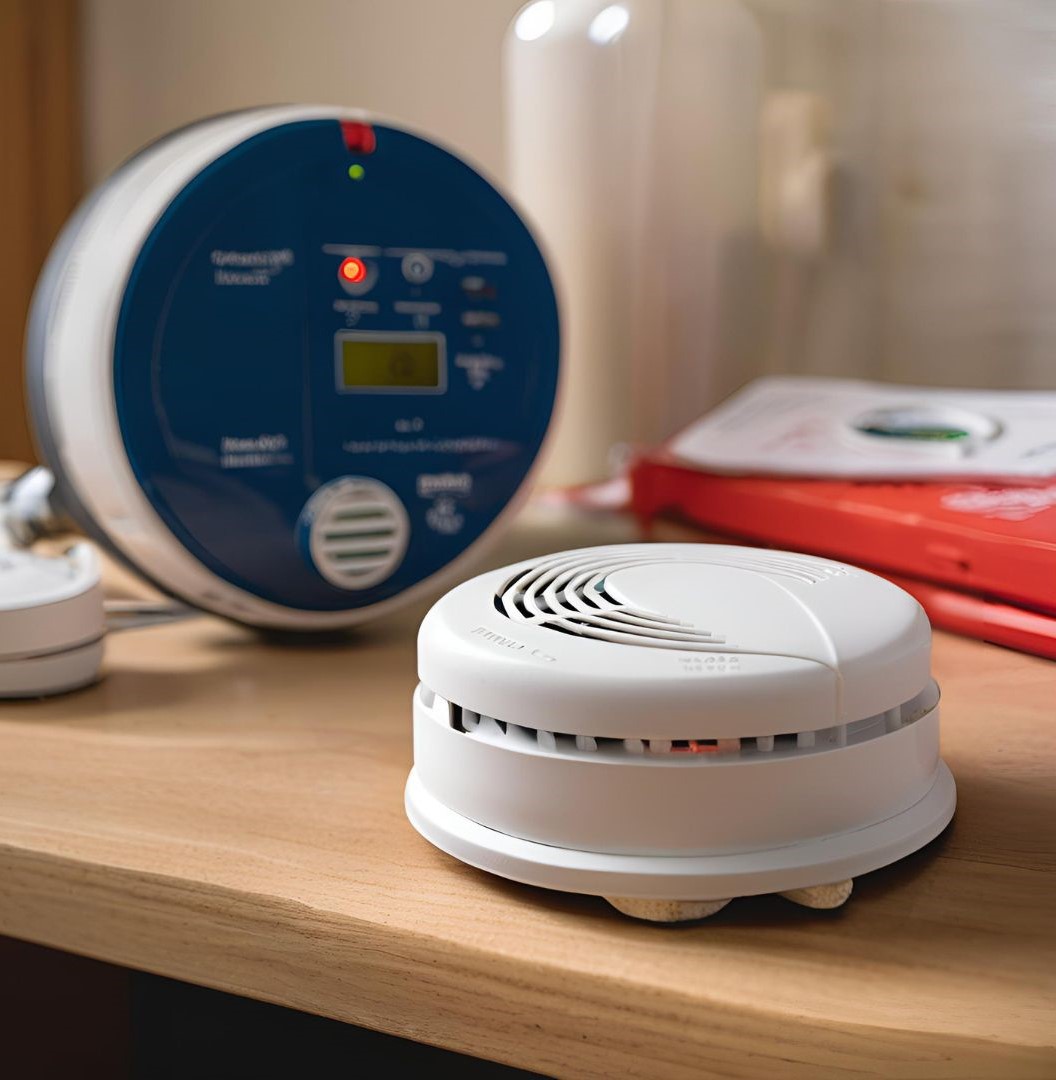
Monthly Testing
It’s smart to test your smoke alarms and CO detectors every month. This keeps everyone safer. Make sure alarms can be heard everywhere in your house. This is because over 170 people die each year from CO poisoning from things not in cars. Monthly tests can help stop these tragedies.
Battery Replacement
Changing the batteries in these detectors is crucial for fire and CO safety. Do this twice yearly, around the time we switch to daylight savings, to create a routine. Also, replace the whole detector every five to seven years. If you don’t know how old it is, play it safe and get a new one.
Regular Cleaning
It’s important to make sure the detectors are clean to work well. Clean off any dust or dirt that might be on them. Don’t cover them with decorations. This keeps them working right, keeping you safe from fires or CO poisoning.
Check HVAC System Filters
Maintaining your HVAC system is crucial for good air and working right. Dirty filters can reduce system efficiency and increase energy costs, making regular inspection and replacement essential. The key part is checking and changing the filters. Let’s look at reusable and disposable filters, why clean filters matter, and how to change them right.
For optimal system efficiency, it’s also recommended to schedule regular HVAC servicing by professionals.
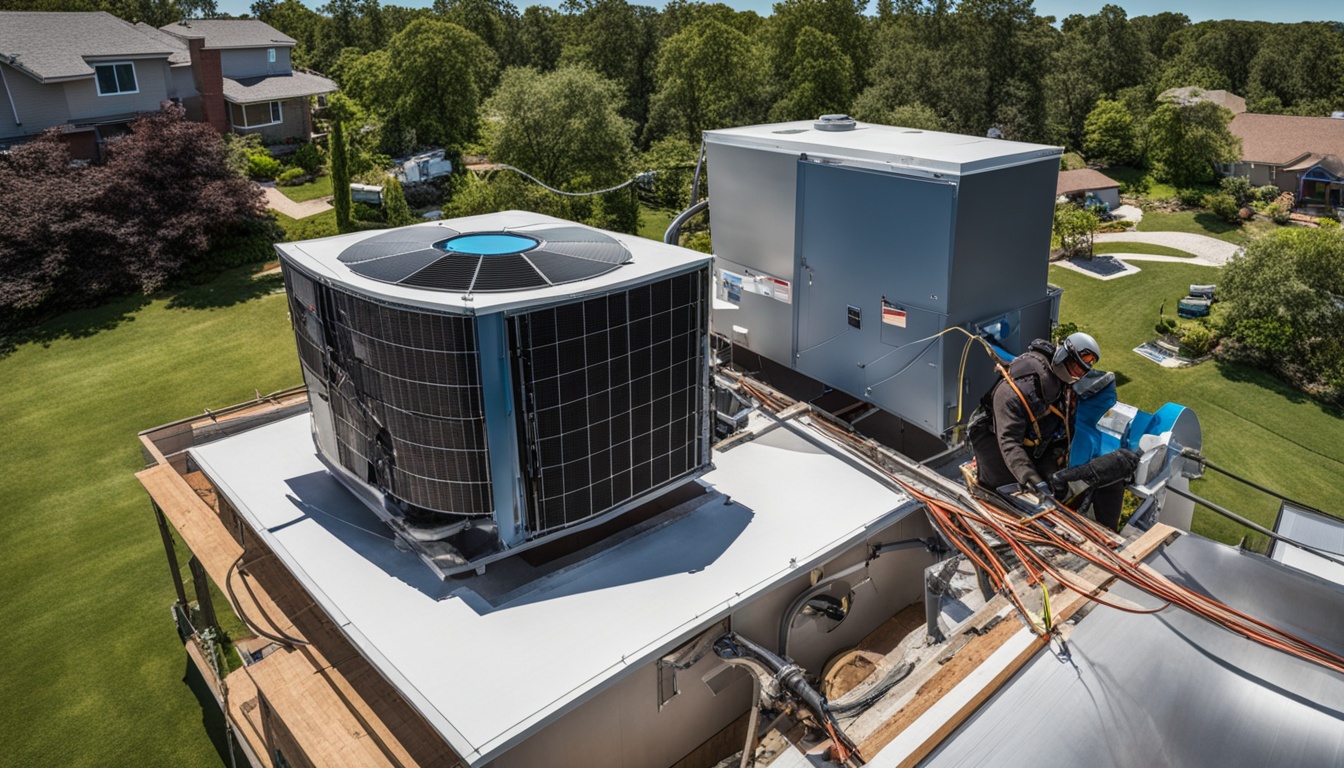
Reusable vs. Disposable Filters
Knowing your HVAC system’s filter type is key for maintenance. Reusable filters save money because you can clean them. But, cleaning them takes more time. On the other hand, disposable filters are easier to change, but it might cost more in the long run. No matter the filter type, changing them right keeps your system working well and the air clean.
Importance of Clean Filters
To keep your home’s air fresh and your HVAC efficient, clean filters are a must. An dirty filter can make your system use more energy, raising bills. Also, a dirty filter means your HVAC might not work well, leading to costly fixes. The EPA says to check your filters each month and change them at least every three months. If you have pets or allergies, you might need to change them more often.
How to Change HVAC Filters
Changing filters is easy but very important. First, find the filters, usually in the return air duct or blower. For reusable filters, take them out, clean them well, and put them back. For disposables, take out the old and put in new ones. Be sure to get the right size and type. Doing this regularly will help your HVAC last longer and keep the air in your home fresh.
Look for Leaks Around Toilets and Sinks
Regular checks for leaks near toilets and sinks are wise. They prevent water damage and mold growth. Look for extra moisture and fix small leaks before they get big.
Homeowners should also check outdoor faucets and exposed pipes for leaks or damage, especially before winter, to prevent freezing and bursting.
Addressing these issues early saves money and keeps your bathroom safe. It’s all about spotting leaks fast and fixing them without delay.
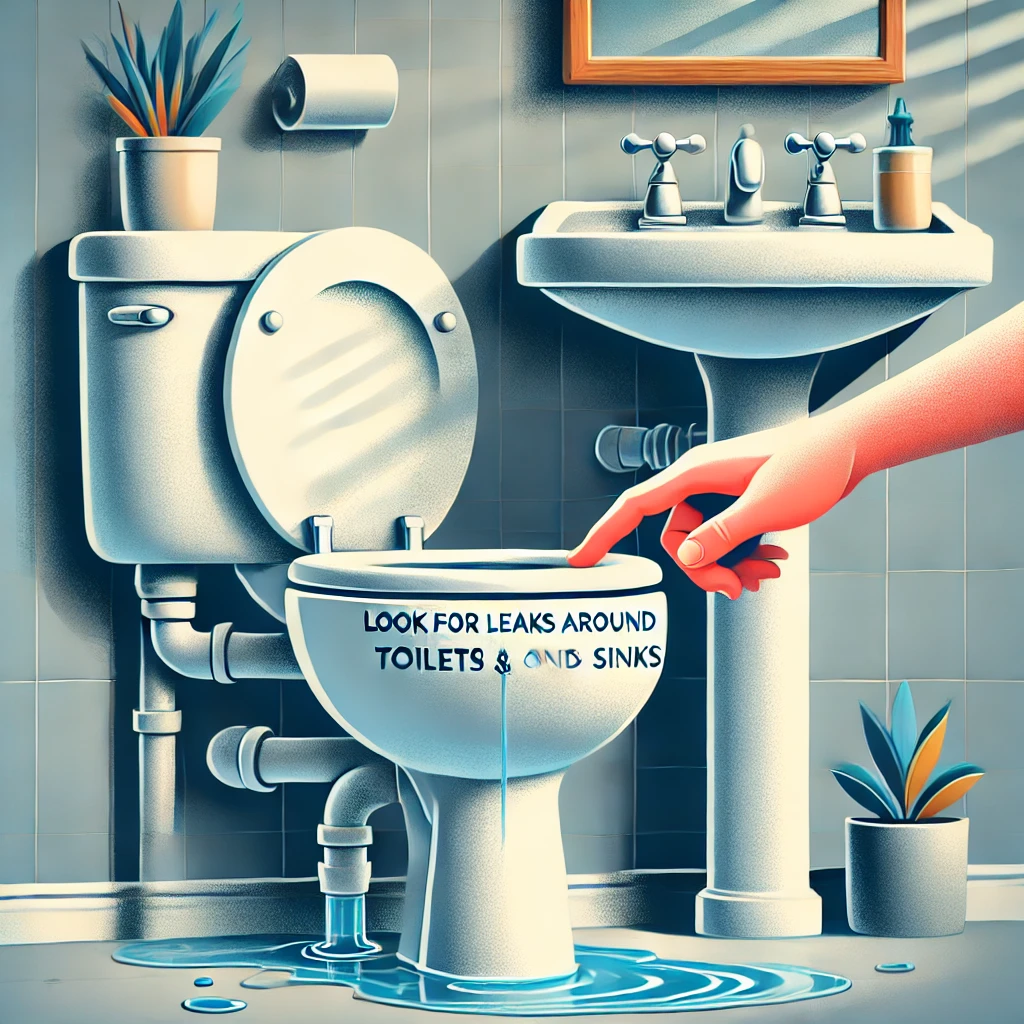
Identifying Water Damage
A leaking toilet can waste hundreds of gallons per day. This is many times the daily water use of an average American. A high water bill might mean you have a leak.
Using food coloring in the toilet tank can show if the flapper is leaking. Moving toilets might leak because the seal is broken. Taps can leak too, causing hidden damage. Finding and fixing leaks early is vital for keeping your bathroom in top shape.
Undetected leaks and poor insulation can also lead to frozen pipes during winter, which may cause significant water damage if not addressed.
Preventing Mold and Mildew
Stopping leaks before they start is important. It saves water and keeps mold and mildew away. Signs of hidden leaks include mold, a musty smell, and water stains.
Fixing minor issues early can prevent major damage. This saves water and avoids big repair bills later. A well-maintained bathroom is a leak-free and healthy space.
Inspect Grout and Caulking
Checking the grout and caulk in your bathroom is very important. It stops water from getting in and causing damage. Keep your tiles well-maintained to protect your bathroom’s look. Make sure to look over these areas each month. This will help keep your bathroom in great shape and avoid big repair bills.
Maintaining Tubs and Showers
Tubs and showers need special care to prevent mold and damage. If the caulk is old or cracked, it lets water through. This water can harm your floors and make tiles weak. Repair caulking and check grout often to make things last longer.
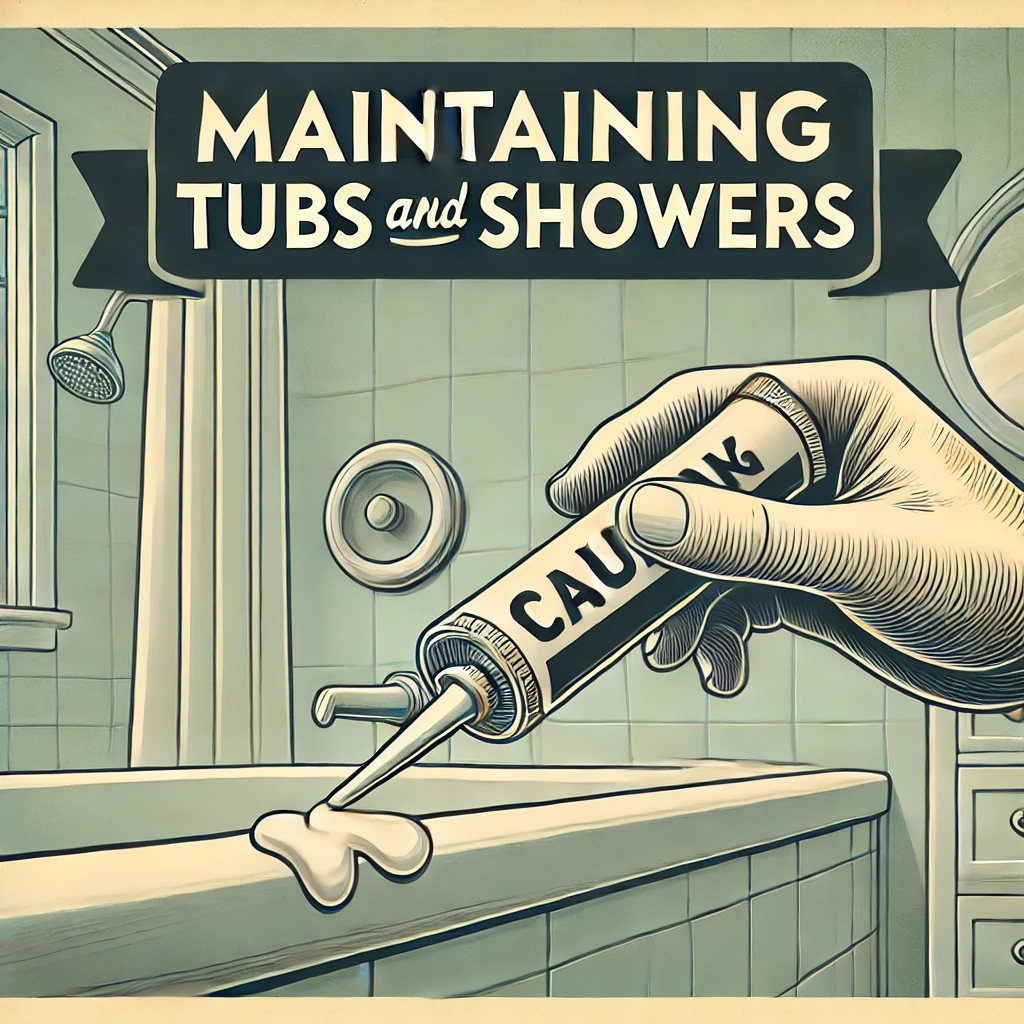
Protecting Against Water Damage
Check plumbing when you look over your home to prevent leaks. Fix dripping faucets quickly to stop damage from getting worse. Good airflow in the bathroom cuts down on moisture. This helps keep mold away. Maintaining caulk and grout is key to protect your bathroom. Inspecting the caulk near sinks and toilets, and grout on the floor, stops hidden water damage.
Check Kitchen Vent and Range Hood Filters
The filters in kitchen vents and range hoods are very important. They catch grease and odors while you cook. You should clean or replace these filters often, depending on how much you cook. If you cook a lot, make sure to check and clean them more. This way, you help keep the air clean in your kitchen. You also lower the chance of fires and help your appliance last longer.
As part of your monthly kitchen maintenance, remember to clean your garbage disposal by grinding ice cubes and using baking soda to remove odors and buildup.
Cleaning Methods
To clean your vent system well, use the right products. Something like Gaylord G510EF Water Wash Hood Detergent and SAFECID CR 909 Multi-Purpose Degreaser works great. For at home, clean range hood filters with warm, soapy water. Some can even go in the dishwasher, making it easy for you.
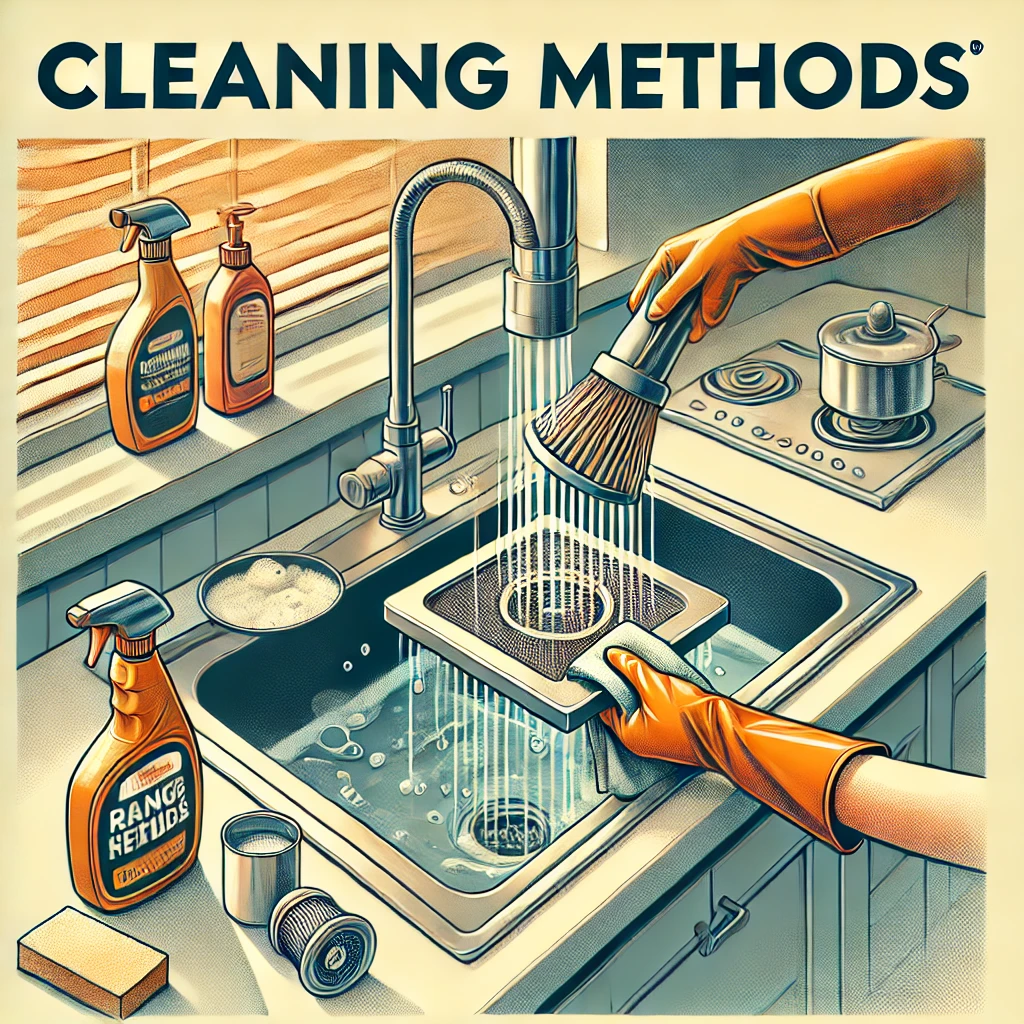
Frequency of Maintenance
It’s crucial to keep up with cleaning your kitchen vents and filters. The NFPA 96 Standard says they should be cleaned weekly to monthly, based on your cooking habits. If you cook a lot, make sure to clean them more often. Charcoal filters need to be changed after 150 hours or every three to six months. For stainless steel baffle filters, check and clean them often for the best results.
Trip Ground Fault Circuit Interrupter (GFCI) Outlets
GFCI outlets keep us safe around water. They should be tested often. This small check is a big help.
As part of your monthly home systems check up, inspect electrical cords for any signs of damage and make sure all outlets, including GFCI outlets, are working properly to maintain electrical safety.
Testing GFCI Outlets
To test a GFCI outlet, plug something in and turn it on. Then, press “Test.” If it turns off, it’s good. But if not, get help from an electrician. OSHA says to replace broken GFCIs to stay safe.
Importance of GFCI Functionality
If just 0.005 amps leak, GFCIs stop to prevent shocks. Test them monthly to make sure they work. This keeps your home safe from electrical problems.
Wet areas and too many plugs can make GFCIs turn off. So, check them to avoid problems. This keeps you safe from shocks.
Old wires or devices can make GFCIs stop working. Sometimes, they just wear out over time. Have them looked at as needed. This keeps your home safe from electrical problems.
GFCIs can save lives by stopping power fast in emergencies. Keep them working well to avoid shocks. For more help, check out this helpful forum.
Walk Around the Exterior of Your Home
Checking your home’s outside often is key. It keeps your place safe and looks good. Always start by looking at the base for cracks. Also, see if there’s any wet spots that might be a problem. Make sure the vents, gutters, and downspouts are clear. If they’re blocked, water harm could happen.
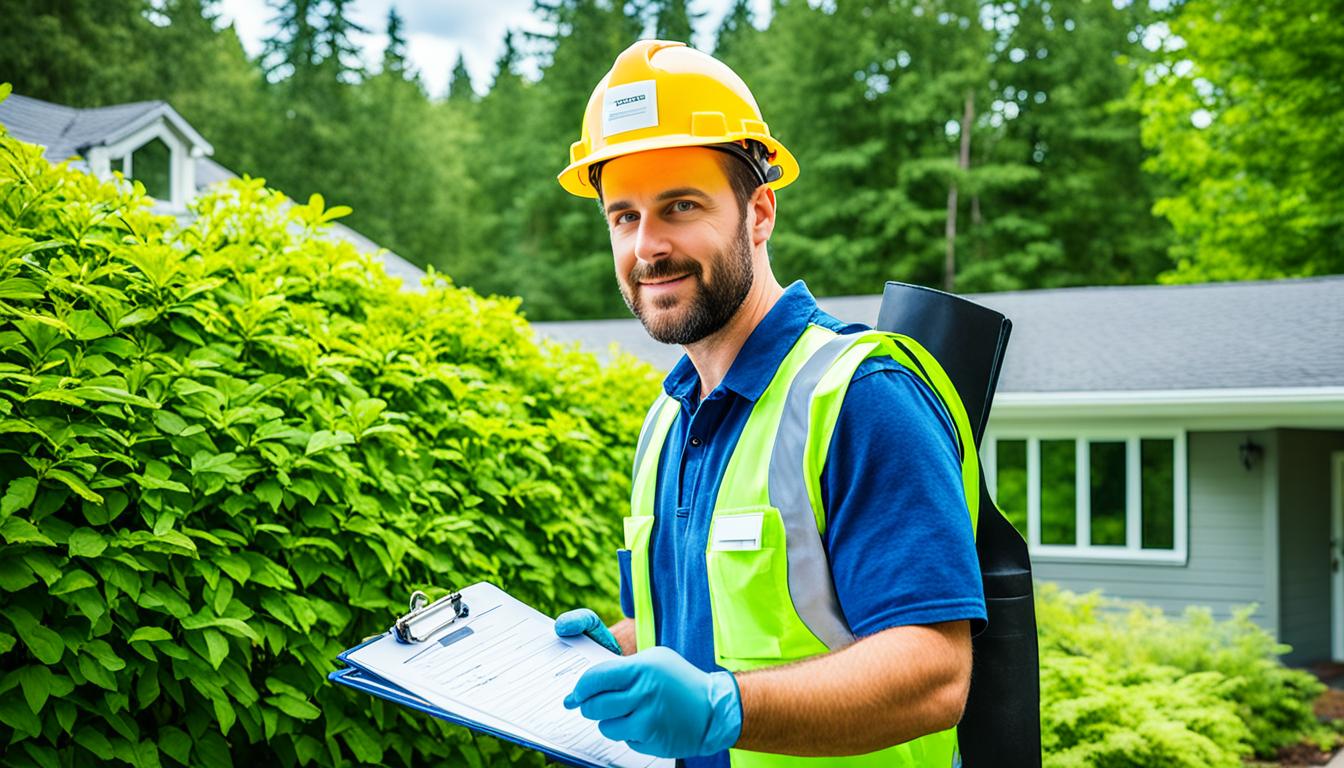
Experts begin outside when checking a house. They look from the top of your roof down to the ground. Roof inspections and other professional inspections are recommended for complex or safety-critical exterior tasks to catch issues early and ensure everything is functioning properly. This way helps keep the place safe. It also lowers the chance of theft. Most crimes against those over 65 are about their homes. So, a solid check outside does a lot.
Take care of fall tasks like getting rid of leaves. This keeps water issues at bay and reduces fire hazard. If you spot any damage early, you can fix it fast. This might save money on repairs later. Also, check your windows and doors. They should lock tight. This step is big for keeping your house safe.
As winter weather approaches, prepare by disconnecting garden hoses, checking the sprinkler system for leaks or broken heads, and protecting outdoor faucets. Inspect for ice dams during winter to prevent leaks and structural damage. Maintain your lawn mower and other gardening tools for proper yard care. For tasks that require specialized skills or equipment, seek professional help.
Sometimes people fall at home, especially if paths are uneven. Making sure your outside is bright helps a lot. You can add LED lights for $15. Motion lights are great too and start at $14. For those with diabetes, wearing good shoes stops falls.
Doing this check often makes your home safer. It also means your home will last longer. Plus, it’s nice to know your home is in good shape.
Check Fire Extinguishers and Emergency Supplies
Checking fire extinguishers and emergency supplies each month is key in being ready for emergencies. It makes sure fire extinguishers can work during a fire and are easy to get to. Doing these checks often cuts down on fire risks a lot.
Be sure to include supplies for a power outage in your emergency kit, such as flashlights and backup power sources, to ensure you are prepared if the electricity goes out.
Inspecting Fire Extinguishers
About 90% of fires in businesses are put out by people with fire extinguishers. So, having them work well is very important. The NFPA and OSHA say we must look at our fire extinguishers every month and keep records for a year. We check they are easy to get, the pressure is right, and they are not broken. Also, we test them every few years to make sure they work right.
Updating Emergency Kits
It’s also important to update your emergency kits. Make sure to check them each month. Get rid of old stuff, add new things, and make sure you have enough of everything. Keeping your kit up to date means you will have what you need when things go bad.
Ensuring Proper Storage
Storing your fire extinguishers and emergency supplies well is a must. They should be in a safe spot that you can reach easily. Make sure they are not blocked and are close by. If you store them well and check them regularly, you can stop small problems from becoming big ones.
Benefits of Regular Maintenance
Keeping up with regular home maintenance brings a host of benefits. First, it helps prevent costly repairs by catching problems early, before they become major headaches. Regular maintenance also improves indoor air quality, especially when you stay on top of tasks like changing air filters and cleaning vents. By maintaining your home’s systems, you can reduce energy costs and make your living space more comfortable. Plus, a well-maintained home holds its value better and is more appealing to future buyers. Most importantly, regular maintenance tasks create a safer environment for your family, reducing the risk of accidents and health issues.
FAQ
What are some essential monthly safety checks for homeownership?
Check your HVAC filters and test your alarms. Look for leaks near toilets and sinks. Also, check the condition of grout and caulking in wet spots.
How often should I test my smoke and carbon monoxide detectors?
Test your alarms every month.
When should the batteries in smoke and carbon monoxide detectors be replaced?
Change the batteries at daylight saving time changes. This keeps them working all year.
How do I clean my smoke and carbon monoxide detectors?
To clean, remove dust from the detectors. This ensures they work properly.
What is the difference between reusable and disposable HVAC filters?
Reusable filters can be cleaned and used again. Disposable filters should be changed every few months.
Why is it important to keep HVAC filters clean?
Clean filters mean your system works better. They also help save on energy bills and improve air quality.
How do I change my HVAC filters?
First, turn off your system. Then, take out the old filter and put in a new one. Follow the specific steps for your filter type.
How can I identify leaks around toilets and sinks?
Look for water or moisture where it shouldn’t be. This includes the base of the toilet and under the sink.
What are the dangers of undetected leaks in the bathroom?
Leaks can cause serious problems like water damage and mold. Regular checks can stop these issues early.
How do I maintain grout and caulking in tubs and showers?
Check them every month. Fix any voids or cracks. This stops water from causing damage.
Why should I clean kitchen vent and range hood filters regularly?
Cleaning these filters keeps the air clean. It also lowers the fire danger and makes your appliances last longer.
How often should kitchen vent and range hood filters be cleaned?
The cleaning depends on how often you cook. Cook often? Clean the filters more often to keep them working well.
How do I test Ground Fault Circuit Interrupter (GFCI) outlets?
Plug a device in and press the test button. This cuts off power. Press the reset to turn the power back on. Replace any that do not work right away.
Why is it important to conduct exterior home inspections regularly?
Checking your home’s outside regularly lets you find problems early. This helps prevent big damage and expensive repairs.
What should I check during an exterior inspection?
Look at the foundation, vents, gutters, and downspouts. Check for damage or blockages. Removing leaves can stop clogs.
How do I check and maintain fire extinguishers?
Make sure they are easy to get to. Check their charge and the expiration date. Also, make sure your emergency kit is full and kept in the right place.

More Posts
The Power of Automation in Workflow Organization
In today’s fast-paced business environment, workflow organization is essential for staying competitive. Business process optimization, productivity gains, and cost savings can all be achieved with the help of workflow automation. In this blog,...
10 Weekly Journal Prompts for Self-Reflection
Using weekly journal prompts is great for your mental health and personal growth. In today's fast-paced life, taking time for self-reflection is key. It helps you understand yourself better, improve your mental health, and reach...
6 Golden Rules of Planning & Setting To Consider
Planning is vital to any successful project. The more you plan, the better your project will be and the less stress you will feel. However, planning can be quite challenging. Planning can be...
11 Benefits of Weekly Themes for Schools
Weekly themes in schools bring many benefits. They make learning fun and help students feel they belong. This way, every student gets to show their unique self. It makes schools more welcoming for...